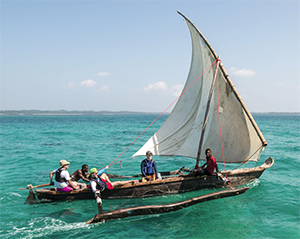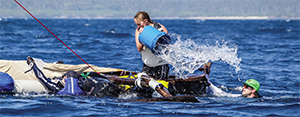Interested in assembling a native Tanzanian double outrigger boat called a ngalawa and sailing it 500 miles around the Zanzibar Archipelago while sleeping on the beach each night? Then the Ngalawa Cup in Tanzania, an adventure by any standard, could be the race for you.
Of course, you might also want to read the disclaimer on the Ngalawa Cup website (www.theadventurists.com/ngalawa-cup-the-what/). It’s an important clue as to how challenging and potentially risky this event is for it participants: “These are not holidays. These are adventures and so by their very nature extremely risky. You are really putting your health and your life at risk. That’s the whole point.”
The race is put together by a U.K.-based group called The Adventurists, which organizes a series of other adventure races including rickshaw racing in China, an auto rally in Mongolia and a motorcycle race across a frozen Lake Baikal.
The Ngalawa Cup boats are traditional craft of the area used by fishermen, and racing them evidently requires at least as much skill at jury-rig repair as sail-handling. The Ngalawa Cup website describes them this way:
 |
|
Some glorious sailing with all going well. |
|
Courtesy The Adventurists |
“Ngalawas are traditional fishing boats whose hulls are carved by hand from mango trees with outriggers lashed on. The boats require ongoing care and attention to maintain and sail efficiently and most previous competitors have had to rely on their seamanship and the knowledge and help of local islanders to get the most from their Ngalawas.”
British sailor Ryan Horsnail, who is currently circumnavigating on a catamaran, said this about his participation in the 2015 race: “Reaching the end was an amazing experience and relief. We’d worked so hard to get there, had so many things gone wrong along the way, been sunburnt, exhausted, scared, bruised and battered around, but we’d taken on the challenge and completed it. Just the thought of it puts a smile on my face every time.”
The Ngalawa Cup was last run in July of 2016 and won by a pair of Swedish sailors, Martin Letzter and Olof Sundstrom. They suggested that their win had to do with good advance preparation. “If you do nothing to the boat, it is very unlikely I’d say that it will make it in one piece. You need to prepare the boat for the crossing, especially as you’re going to push the boat quite far. Everything is readily at hand. Spend a couple of days or two buying a couple of hundred meters of rope and tie everything together and bring repair stuff on the boat so you can repair everything on the move.”
 |
|
A racer does a bit of dewatering. |
|
Courtesy The Adventurists |

